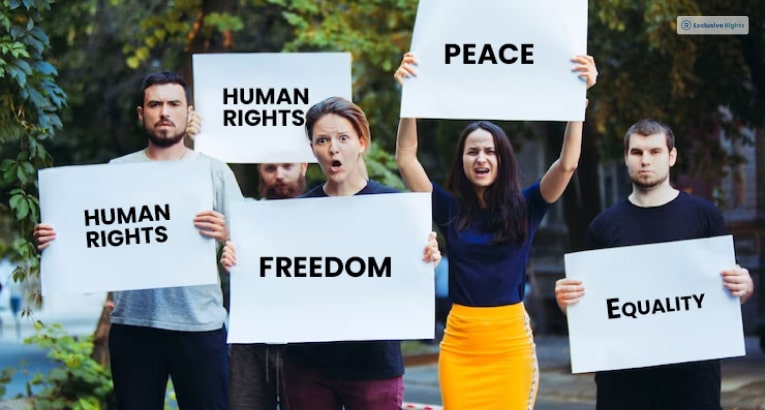
Table Of Contents
- What Is The ‘Universal Declaration Of Human Rights (UDHR)’?
- What Is The Significance Of The Universal Declaration Of Human Rights Designed?
- What Does The Universal Declaration Of Human Rights State?
- The 30 Articles Of The Universal Declaration Of Human Rights
- Article 1: Right To Equality
- Article 2: Freedom From Discrimination
- Article 3: Right To Life, Liberty, Personal Security
- Article 4: Freedom Of Slavery
- Article 5: Freedom From Torture And Degrading Treatment
- Article 6: Right To Recognition Before Law
- Article 7: Right To Equality Before Law
- Article 8: Right To Remedy By Competent Tribunal
- Article 9: Freedom From Arbitrary Arrest And Exile
- Article 10: Right To Fair Trial
- Article 11: Right To Be Considered Innocent Until Proven Guilty
- Article 12: Right To Privacy
- Article 13: Right In Freedom Of Movement
- Article 14: Right To Asylum In Other Nations For The Purpose Of Persecution
- Article 15: Right To Nationality And Freedom To Change It
- Article 16: Right To Marriage And Family
- Article 17: Right To Property
- Article 18: Freedom Of Religion Or Belief
- Article 19: Freedom Of Expression
- Article 20: Freedom Of Assembly
- Article 21: Right To Partake In Public Affairs
- Article 22: Right To Social Security
- Article 23: Right To Work
- Article 24: Right To Leisure
- Article 25: Right To Adequate Standard Of Living
- Article 26: Right To Education
- Article 27: Right To Participate In Cultural Activities
- Article 28: Right To A Free And Just World
- Article 29: Duty Towards Community
- Article 30: Rights Are Inalienable
- Conclusion
What Is The Universal Declaration Of Human Rights?
The Universal Declaration of Human Rights is a vital piece of documentation that states the rights vested in all human beings. The document states the rights and freedoms that are rightfully vested in all human beings across the globe.
In the following article, we will provide the concept of the Universal Declaration of Human Rights. Along with stating the 30 articles that are enshrined in the Declaration.
What Is The ‘Universal Declaration Of Human Rights (UDHR)’?

The Universal Declaration of Human Rights (UDHR) is a document that articulates the fundamental rights and freedoms for all human beings.
The General Assembly of the United Nations adopted the Declaration in 1948. Creation of this Declaration was motivated by the experiences of two preceding world wars.
The Universal Declaration is a document that has been observed to have brought various nations across the world in agreeing for creation of an universal statement of human rights.
The UDHR acts as a roadmap for all nations across the world in terms of freedom and equality. This document protects rights and freedoms of all individuals, everywhere on Earth.
The UDHR is the proof that all nations can come to an agreement regarding every human being’s right to live freely, equally, and with dignity.
What Is The Significance Of The Universal Declaration Of Human Rights Designed?

The UDHR is a revolutionary piece of document that has enabled all nations across the globe to agree on the rights and freedoms that are vested on all human beings.
This was agreed for all human beings irrespective of the sex, creed, color, religion, and other features.
What Does The Universal Declaration Of Human Rights State?

The Universal Declaration of Human Rights has been noted to begin its function through the recognition of the inherent dignity of all members of the human family as the foundation of freedom, justice and peace in the world.
The UDHR declares that human rights of humans are universal. All individuals have the right to enjoy these rights irrespective of where they live or who they are.
The Universal Declaration of Human Rights includes both ‘civil and political rights’. These include, right to life, liberty, free speech, and privacy.
The UDHR also states economical, social and cultural rights. These include the right to social security, education and health.
The 30 Articles Of The Universal Declaration Of Human Rights
The UDHR has been recognised to have a presence of 30 articles in total.
These articles describe the various rights and freedoms that are universally vested in all individuals.
The 30 articles are as follows:
Article 1: Right To Equality

The first article of the UDHR is based on the aspect that all individuals are equal. This means, we are all born free and have individual thoughts and opinions.
Moreover, we have the right to be treated equally irrespective of sex, race, religion, and other socio-cultural factors.
Article 2: Freedom From Discrimination

The second article of the UDHR states all individuals are born equal.
This implies, irrespective of their race, color, religion, political opinion, language and region they reside have the right to be treated with equality.
This means, we have the right to act against any discrimination that occurs against us based on the mentioned factors.
Article 3: Right To Life, Liberty, Personal Security

The third article of the UDHR states that everyone has the right to life.
This does not mean, we are living for the sake of being alive. But we have the inborn right of living with liberty and appropriate safety.
Article 4: Freedom Of Slavery
The fourth article of the UDHR states that no human being has the right to become a slave or make someone else a slave.
This means, as human beings we have the freedom from slavery.
This article has also banned the occurrence of slave trades.
Article 5: Freedom From Torture And Degrading Treatment

The fifth article of the UDHR states that no human being could be subjected to or subject to degrading or torture.
As human being we have the right of not being subjected to cruel treatments, torture, degrading treatment or punishment.
Article 6: Right To Recognition Before Law
The sixth article of the UDHR states that every human being has the right to recognition before law irrespective of their location.
As human beings we have the right to have recognition as a person before any law across the globe.
Article 7: Right To Equality Before Law
The seventh article of the UDHR states that the law is equal for all human beings.
We have equality before the law and none of our socio-cultural or economical factors can discriminate us in the court.
We also have the right of equal protection from any forms of discrimination by the law.
Article 8: Right To Remedy By Competent Tribunal
The eighth article of the UDHR states that all individuals have the right to have access to justice.
We have the freedom and right to approach the legal system if we feel that our rights are violated.
We also have the right to acquire remedy through a competent national tribunal against violation of our fundamental rights.
Article 9: Freedom From Arbitrary Arrest And Exile

The ninth article of the UDHR implies that no human being can be arrested or detained arbitrarily.
As human beings nobody has the right to arrest or detain us in an unjustified manner.
Article 10: Right To Fair Trial
The tenth article of the Declaration states that all human beings have the right to be tried by an impartial and independent court.
As human beings we are entitled with the full freedom of being tried in an impartial court during circumstances of any charges that are pressed against us.
Article 11: Right To Be Considered Innocent Until Proven Guilty

The Eleventh article of UDHR states that all human beings pressed with legal charges will be considered innocent till proven guilty.
The article also states that an individual charged within criminal offense has the right to defense.
Additionally, this article also states that one cannot be charged as guilty for a penal offense in terms of an act that does not constitute a penal offense in both national and international law.
The accused person also has the right of not acquiring any stricter penalty than the one that is applicable as per the time of the penal offense has been committed.
Article 12: Right To Privacy
The twelfth article of the UDHR has stated that all human beings have the right to privacy.
All human beings have the right of protection regarding circumstances when someone has intentionally harmed your good name, invaded your living space, or interfered with your correlations.
We have the freedom and right from being protected by the law in terms of unwanted attacks or interference.
Article 13: Right In Freedom Of Movement
The thirteenth article of the UDHR states that all human beings have the freedom of leaving within their own country.
Alongside, you also have the right to return to your own nations after completing all travels.
Moreover, you also have the right to movement and residence within States in your nation.
Article 14: Right To Asylum In Other Nations For The Purpose Of Persecution

The fourteenth article of the Declaration states that as human beings we have the right to seek protection in other nations.
This means, all individuals have the freedom to leave their own nation for the purpose of protection from persecution.
On the contrary, the right is not applicable in cases of persecution that arises from non-political crimes.
Or from acts that go against the purpose and principles of the United Nations.
Article 15: Right To Nationality And Freedom To Change It

The fifteenth article of the UDHR states that all human beings are vested with the right of having a nationality.
The right also provides the individual with the capacity to change as per their own will.
As individuals, we have the right to reside in a nation and acquire its nationality.
We also have the right of not being arbitrarily deprived of our right to have a nationality or change the same.
Article 16: Right To Marriage And Family

The sixteenth article of the UDHR provides the right to both men and women to marry and have a family.
The article states that no man or woman having the legal capacity to marry can be limited to do the same in terms of their race, nationality, or religion.
Additionally, families are also vested with the right of being protected by the government and justice system.
We as human beings have the right to marry after attainment of majority. Moreover, we also have rights as to marriage, during the marriage and during its dissolutions.
Individuals are also vested with the right to enter marriage with their consent. And no human being can be forced into marrying that they are not interested in.
Lastly, the family that arises with marriage is observed to be the fundamental and natural institution of society. This article protects the family by government and societal forces.
Article 17: Right To Property

Seventeenth article of the UDHR provides every individual with the right of owning property. It also protects the property from illegal acquisition.
We as human beings have the freedom and right of owning property.
We also have the protection from law in terms of illegal deprivation that might restrict us from owning a property.
Article 18: Freedom Of Religion Or Belief

The eighteenth article of UDHR provides all individuals with the right to freely follow any religion or belief.
We also have the right to change our beliefs and religion as per our wish.
Article 19: Freedom Of Expression

Nineteenth article of UDHR states an individual’s right to express their opinions.
We as human beings have the freedom to state our opinion without anyone restricting us from doing so.
Article 20: Freedom Of Assembly
Twentieth article of the document provides every individual the right to effectively organize in peaceful assembly.
We also have the freedom of choosing the affairs we are interested in participating in. So, we cannot be forced by anyone to participate in an association.
Article 21: Right To Partake In Public Affairs
This article states, all individuals have the right to participate in the public affairs of the nation.
We as citizens have the right to vote or stand in elections within a particular region.
Article 22: Right To Social Security

This article of the document provides rights to individuals regarding attainment of advantages provided by national and state governments.
We have the freedom to acquire every benefit the nation provides as equal citizens.
Article 23: Right To Work

Twenty third article states every human being has the right to employment.
We as human beings have the right to choose a work that would provide us with a salary. That specially supports our lives and families.
We also have the right to get equal pay for equal work.
Article 24: Right To Leisure
Twenty fourth article of UDHR states the right to rest and leisure for all individuals.
No work day can be long enough that restricts you from getting appropriate rest and leisure.
We also have the right to acquire paid holidays on a regular basis.
Article 25: Right To Adequate Standard Of Living
The twenty fifth article of the Declaration states that every individual has a right of standard of living.
This means, we have the right to acquire the necessary items and services that would keep us physically fit, fulfilled and shelter over our heads.
Right to food, shelter, clothing and healthcare falls in this category.
Article 26: Right To Education

The twenty sixth article of the Declaration provides the right to every individual to acquire knowledge irrespective of their race, religion, sex, color and other factors.
We as human beings have the ability to pursue education as per our wish.
Due to this, nobody has the right to restrict us from pursuing while having the merit to do so.
Article 27: Right To Participate In Cultural Activities
The twenty seventh article of the UDHR states that every human being has the right to take part in a community’s cultural, scientific, and arts.
Additionally, the article also vests the rights associated with protection of an author who has participated in creation of any scientific, literary, or artistic aspects.
This means, individuals have the right in protecting their intellectual abilities.
Article 28: Right To A Free And Just World
The twenty eighth article of the UDHR has been noted to vest the right of respecting others and own rights.
We as human beings should be effectively complying with the rights that are included in the Declaration.
This practice will lead to developing a fair and just world.
Article 29: Duty Towards Community
The second last article of the UDHR has been observed to provide the duties that are crucial for all individuals to follow.
We as individuals have the duty of fulfilling the principle of respecting all rights of other individuals.
This assists in the capacity to effectively comply with the primary objective of the UDHR, which is respecting and trusting all individuals.
The article also states that no individual would be practicing any of these rights and freedoms that go against the principles of the United Nations.
Article 30: Rights Are Inalienable
The last article of the UDHR states that none of the rights could be destroyed by any institution or individual.
This means, no authority has the power to destroy any of the above mentioned rights and freedoms enshrined by the Universal Declaration of Human Rights.
We as individuals cannot act in a way that might destroy the enshrined rights and freedoms.
Conclusion
The Universal Declaration of Human Rights has been observed as a vital documentation that states all the rights and freedoms that are vested in all human beings.
The document has also provided foundations for development of international human rights laws.
Having an appropriate knowledge regarding the rights and freedoms will allow you to effectively determine when and where your rights are violated.
In such circumstances, you can acquire advice from an experienced human rights attorney. He or she will effectively guide you in ways you can fight for the purpose of protecting your vested rights.
Read More :









